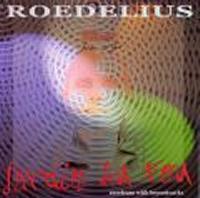Cluster were a German musical duo consisting of Hans-Joachim Roedelius and Dieter Moebius, formed in 1971 and associated with West Germany's krautrock and kosmische music scenes. Born from the earlier Berlin-based group Kluster, they relocated in 1971 into the countryside village of Forst, Lower Saxony, where they built a studio and collaborated with musicians such as Conny Plank, Brian Eno, and Michael Rother; with the latter, they formed the influential side-project Harmonia. After first disbanding in 1981, Cluster reunited several times: from 1989 to 1997, and from 2007 to 2010.
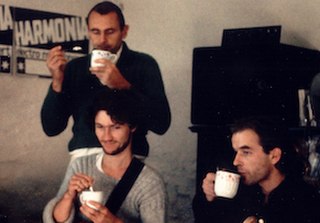
Harmonia was a West German musical "supergroup" formed in 1973 as a collaboration between members of two prominent krautrock bands: Cluster's Hans-Joachim Roedelius and Dieter Moebius joined by Neu! guitarist Michael Rother. Living and recording in the rural village of Forst, the trio released two albums—Musik von Harmonia (1974) and Deluxe (1975)—to limited sales before dissolving in 1976.
Kluster was a Berlin-based German experimental musical group formed in 1969 by Hans-Joachim Roedelius, Conrad Schnitzler, and Dieter Moebius. Their improvisational work presaged later industrial music. The original Kluster was short-lived, existing only from 1969 until mid-1971 when Conrad Schnitzler left and the remaining two members renamed themselves Cluster. Schnitzler later revived the band from 1971 to 1973 and then from 2007 until his death in 2011.

Begegnungen II is a Sky Records 1985 compilation album with recordings by Brian Eno, Dieter Moebius, Hans-Joachim Roedelius, Conny Plank, Cluster, from solo albums, and from various collaborations between the artists. All of the tracks had been previously released elsewhere. The albums these tracks were drawn from are: Material by Moebius & Plank, Zero Set by Moebius, Plank, Neumeier, Durch Die Wuste and Lustwandel, both Roedelius solo albums, After The Heat by Eno, Moebius, Roedelius, Tonspuren, the first solo album by Moebius, Sowiesoso by Cluster, and the eponymous Cluster & Eno. These albums were released by Sky between 1976 and 1983.

Großes Wasser is the seventh album by the electronic music outfit Cluster. It was co-produced by former Tangerine Dream member Peter Baumann. Großes Wasser marked the return to Cluster working as a duo of Hans-Joachim Roedelius and Dieter Moebius after two albums collaborating with Brian Eno.

Hans-Joachim Roedelius is a German electronic musician and composer. He is best known as a co-founder of the influential krautrock groups Cluster and Harmonia. He also performed in the ambient jazz trio Aquarello.

Klopfzeichen is the first full-length album by German experimental music trio Kluster.
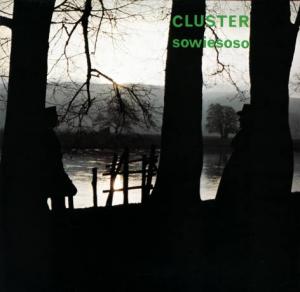
Sowiesoso is the fourth studio album by German electronic music band Cluster, released in 1976. It was Cluster's first release for Sky Records. Sowiesoso was recorded in just two days in Forst, Germany in 1976 and mixed at Conny's Studio in Wolperath.

Deluxe is the second album from the West German krautrock group Harmonia, featuring Neu! guitarist Michael Rother with the duo Cluster. It was recorded in June 1975 in Harmonia's studio in Forst, Germany. It was first released on the Brain Records label in 1975.
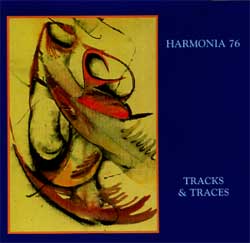
Tracks and Traces is a collaborative album by German kosmische supergroup Harmonia and British musician Brian Eno, initially credited to Harmonia 76. Eno joined the group at Harmonia's studio in Forst, Germany for the September 1976 recording sessions.
Moebius & Plank was a German electronic music duo consisting of musicians Dieter Moebius and Conny Plank. They recorded three albums between 1979 and 1986 as well as two additional albums, one a collaboration with Mani Neumeier and the other with Mayo Thompson. Plank died of cancer in 1987. Their final two albums were released posthumously in 1995 and 1998 respectively

Selbstportrait is the third solo album by German keyboardist Hans-Joachim Roedelius, best known for his work with Cluster, Harmonia, and Aquarello. The title is German for "Self Portrait", a title meant to reflect the gentle, introspective nature of the ambient and new-age music of the album. The original Sky Records release was subtitled Teil 1 Sanfte Musik, German for "Part 1, Soft Music."
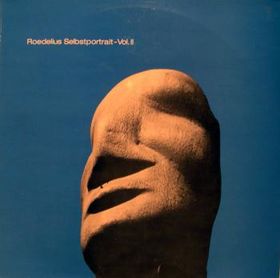
Selbstportrait – Vol. II is the fourth solo album by German keyboardist Hans-Joachim Roedelius, best known for his work with Cluster, Harmonia and Aquarello. The title is German for "Self Portrait - Vol. II", a title which clearly reflects the gentle, introspective nature of this album of ambient or new-age music. It is the second of seven albums in Roedelius' Selbsportrait series of recordings. The album is subtitled "Freundliche Musik", German for "Friendly Music".
Aquarello was a musical group which blended ambient music and jazz. The trio included keyboardist Hans-Joachim Roedelius, based in Austria, and two Italian musicians, multi-instrumentalist Fabio Capanni, and saxophonist Nicola Alesini. They were active between 1991 and 1998, recording and releasing three albums.
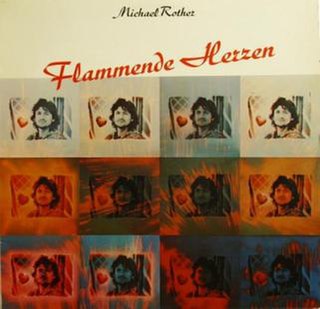
Flammende Herzen is the first studio album by the German solo artist Michael Rother. It was released in 1977 and includes the single "Flammende Herzen" b/w "Karussell". The music was used the following year to soundtrack Flaming Hearts. It was Rother's first solo venture after having recorded five albums prior as a member of Neu! with Klaus Dinger and Harmonia with Hans-Joachim Roedelius and Dieter Moebius.

Wenn Der Südwind Weht is the seventh solo album by German keyboardist Hans-Joachim Roedelius, best known for his work with Cluster, Harmonia, and Aquarello. All the pieces on the album were composed by Roedelius. It was released by Sky Records in 1981 and has been reissued on CD by Sky Records in Germany by the Gyroscope label in the United States in 1996. The Bureau-B label reissued Wenn Der Südwind Weht in the European Union on both CD and 180 gram vinyl LP in 2010.

Flieg' Vogel fliege is the ninth solo album by keyboardist Hans-Joachim Roedelius, best known for his work with Cluster, Harmonia, and Aquarello. According to Roedelius biographer Stephen Iliffe this album is also titled Selbstportrait IV, but that name does not appear on the album sleeve or label. Flieg' Vogel fliege was recorded at Roedelius' home studio and completed at Erpelstudio, Vienna, Austria. Flieg' Vogel fliege was released by Sky Records on vinyl in 1982. Flieg' Vogel fliege was the final album Roedelius recorded for Sky Records.
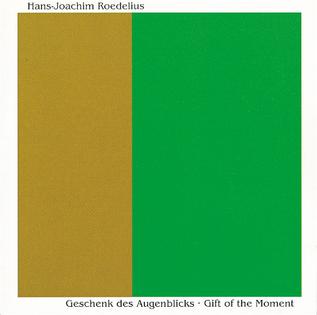
Geschenk des Augenblicks – Gift of the Moment is the eleventh solo album by German keyboardist Hans-Joachim Roedelius, best known for his work with Cluster, Harmonia, and Aquarello.
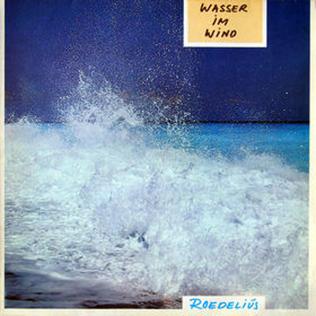
Wasser im Wind is the tenth solo album by keyboardist Hans-Joachim Roedelius, best known for his work with Cluster, Harmonia, and Aquarello.
Bureau B is an independent record label, music publisher and booking agency from Hamburg, Germany, founded in 2005 by Gunther Buskies as a sister label to Tapete Records. The label releases varieties of electronic, free-spirited music, with the spectrum ranging from pop to avant-garde. The label has amassed an extensive catalogue of reissues and new productions, including classics from the genre of electronic music in the 1970s and early 1980s popularly classified as Krautrock, alongside new recordings by such formative artists as Faust, Kreidler, Roedelius, Tietchens, Moebius.
